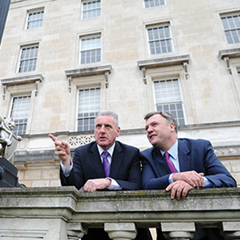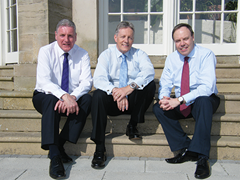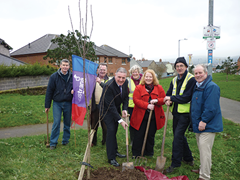Coaker seeks neutral role
 Vernon Coaker wants Westminster to take its responsibilities in Northern Ireland more seriously but maintains that Labour should stay outside local elected politics. The Shadow Secretary of State talks to Peter Cheney.
Vernon Coaker wants Westminster to take its responsibilities in Northern Ireland more seriously but maintains that Labour should stay outside local elected politics. The Shadow Secretary of State talks to Peter Cheney.
The Secretary of State should be “a voice for Northern Ireland in London and not to be the voice of London here,” according to Vernon Coaker. Labour’s Shadow Northern Ireland Secretary differs from Owen Paterson and Theresa Villiers, who actively promote Westminster’s policies in the province, and wants to see the UK Government returning to its role as a “neutral arbiter”.
Born and brought up in west London, where his father was a policeman, Coaker studied economics and politics at Warwick before moving to Nottingham to teach in an inner city comprehensive school. His job as a teacher led to him into elected politics, alongside the miners’ strike: “I was appalled after a few years at the state of classrooms and then obviously I lived in a mining village and saw what was happening there.”
He had a general interest in Ireland during the Troubles but became more involved as a government whip when he met Northern Ireland MPs and started to visit the province.
Local policing and security also crossed his brief when he was a Home Office Minister of State.
“People are so welcoming here, it’s amazing,” he remarks. “People may say it a lot but it doesn’t make it any the less true.”
Community politics is his main motivation and he recognises its importance in Northern Ireland. “That’s about trying to ensure that every community has the same opportunities as other communities have,” Coaker elaborates, “and that in a sense has always driven me.” Overcoming the “inequality of opportunities” between communities means “always trying to ensure that everybody has the best opportunity that you can give them.”
That said, his key priority as Shadow Northern Ireland Secretary is a high level one i.e. to “wake up London” and remind MPs that Westminster “still matters” even after devolution.
“Let’s recognise in Westminster the continuing responsibilities that we have,” he states. “Not interfering and not undermining, obviously, the devolution settlement and the responsibilities here.”
 Following on from that, he pushes the UK Government “where appropriate” to stand up for Northern Ireland’s interests in employment, the economy and welfare reform.
Following on from that, he pushes the UK Government “where appropriate” to stand up for Northern Ireland’s interests in employment, the economy and welfare reform.
Pressed on how he challenges the Executive, he says: “I don’t see it as a matter of improving. I see it as a matter of working with them and trying to support them.”
Coaker brought the flags dispute to the House of Commons for debate and has highlighted the need to tackle sectarianism. When the absence of a cohesion, sharing and integration strategy is put to him, he adds: “It’s also trying to say that this is important for you [the Executive] to get that done.
It’s important for you to see that as a priority.
“It’s also saying that we have to ensure that the economic benefits in Northern Ireland that have been accrued in the progress that’s been made [are] shared by every community and that every community feels as though they’re getting the peace dividend.”
On welfare reform, he appreciates that everyone wants to see people getting back into work but adds that social security is especially needed in a time of cuts and rising unemployment.
Labour also would have made cuts if it had continued in power. “That’s the key political debate,” he responds. “Obviously, Labour would have had a deficit reduction strategy but it wouldn’t have been a reduction where the ‘be all and end all’ was to cut the deficit to the extent that you actually push the economy into a double-dip, and perhaps even a triple-dip, recession.”
In addition, Labour advocates:
• a tax on bankers’ bonuses (and changes to tax relief for higher earners) to fund a real jobs guarantee for young people who have been out of work for a year;
• a temporary reduction in VAT from 20 per cent to 17.5 per cent;
• a one-year national insurance tax break for every SME which recruits extra staff; and
• bringing forward long-term infrastructure investment in Great Britain, which would in turn increase the Executive’s capital budget.
 Coaker won’t be drawn on any positives from the Coalition Government’s term to date. A “huge economic dampener” from government policies means that “everybody’s suffering across the country.”
Coaker won’t be drawn on any positives from the Coalition Government’s term to date. A “huge economic dampener” from government policies means that “everybody’s suffering across the country.”
On political donations, Coaker wants confidentiality to be lifted in Northern Ireland but adds: “We need to arrive at the situation where people actually feel comfortable doing that.”
Theresa Villiers “smiles a lot more than Owen” but both secretaries of state have been “very much the same” in policy terms: “My view is that they should be speaking up for Northern Ireland, standing up for Northern Ireland, much more than is the case at the moment.”
For example, the Driver and Vehicle Agency office in Coleraine carries out licensing work in Northern Ireland on behalf of the Driver and Vehicle Licensing Agency in Britain.
The UK Department for Transport plans to centralise all licensing services in Swansea, with the potential loss of 250 jobs. He questions whether Villiers has lobbied other ministers in London on the impact of this change.
The NIO confirmed that Villiers has visited Coleraine and discussed the matter with Transport Minister Stephen Hammond, to make him aware of the concern felt in the province.
Coaker determines what is in Northern Ireland’s interests by hearing a wide range of opinions on his visits to the province.
The Conservatives have contended that the NIO should represent Westminster’s interests in Northern Ireland, as the UK Government also has a democratic mandate. Coaker sees the province’s interests and those of the UK as inter-related.
Northern Ireland remains the only part of the UK where Labour does not contest elections, a decision re-affirmed by Ed Miliband at last year’s party conference. This could imply that Labour does not trust local people to vote for a potential party of government.
“It’s not about trusting the people of Northern Ireland,” he contends, adding that local people can join the province’s constituency Labour party.
“We shouldn’t forget that, actually, if you look at the operation of the Good Friday Agreement, it has really only been operating functionally since 2007.”
When it is put to him that devolution has now been in place for six years, he turns to the co-guarantor role.
“We see ourselves working with the Northern Ireland Executive, partly with the Irish Government, in ensuring that we’ve secured the peace and progress in Northern Ireland,” Coaker states. “Part of that is being a neutral arbiter and, if you stand for elections, it’s difficult then to be that neutral arbiter.”
Local Labour members, though, have been campaigning to stand candidates, to give non-SDLP voters an extra choice.
A future Labour government would also be unaccountable to the people of Northern Ireland, as no local voter would have a say in its election.
“The priority, I think, for the UK Government, as it is at the moment, is to ensure that we see the outworkings of the Good Friday Agreement,” he replies.
“That has to be the priority for us, that has to be the aim of the Government and, as it stands at the moment, we want to work that through to support that process.”
As Owen Paterson said in opposition, becoming Secretary of State depends on a ‘triple lock’ of the ‘shadow’ winning his seat, the shadow’s party winning the election, and him being appointed to the post by the Prime Minister.
With the next general election due in 2015, Coaker is “confident but not complacent” about taking up office in the NIO. He sums up his ambitions by saying: “I hope that’s possible in the future.”
Labour forum
A consultative forum with members from the UK and Irish Labour parties and the SDLP is Labour’s main concession to local members after refusing to contest Northern Ireland elections. The forum will aim to draw up joint policies before the European elections in June 2014, which will be contested by the SDLP. Its first meeting will take place in the first half of 2013.
The Northern Ireland branch of the Labour Party had submitted a request to contest local elections, also due to be held in 2014. A paper presented to Labour’s National Executive Committee in January explained that the SDLP would see Labour candidates as a “hostile act” towards a sister party.
Irish Labour warned against standing candidates as it could take away support from the SDLP, which was “already weakened by the rise of Sinn Féin.” The decision on contesting elections will be reviewed in due course.
National Crime Agency ‘essential’
Coaker is emphatic that the proposed National Crime Agency’s remit should extend to Northern Ireland. As a rule, the agency needs to be approved by the Assembly through a legislative consent motion. Shadow Home Secretary Yvette Cooper has written to Home Secretary Theresa May to seek progress on this.
“We don’t want Northern Ireland not having the full remit of a National Crime Agency dealing with child trafficking, drugs and [the] cross-border type crime that’s there,” Coaker states. “It’s essential.”
SDLP and Sinn Féin have opposed the move in the Executive, claiming that the agency will not be accountable under the Patten report’s structures for policing. Coaker has raised this with those parties, to see how their concerns could be addressed, but emphasises: “This should be a real priority.”
Parliament can grant the agency power to operate in Northern Ireland, as a last resort, but support from the Assembly is preferred.
Profile: Vernon Coaker
Vernon Coaker was elected MP for Gedling, in Nottinghamshire, at the 1997 general election. He had previously been a councillor on Rushcliffe Borough Council (1983-1997).
He was appointed Parliamentary Under-Secretary of State (for crime reduction) at the Home Office in 2006. Vernon was promoted to Minister of State (for policing, crime and security) in 2008 and moved to the Department of Children, Schools and Families in 2009. He succeeded Shaun Woodward as Shadow Northern Ireland Secretary in October 2011.
Vernon is married to Jackie, and they have a daughter and a son. His interests include sport (a keen Spurs fan), walking in the countryside and current affairs. He is also a strong supporter of UNICEF and has visited projects in Macedonia, Kosovo and Angola.





